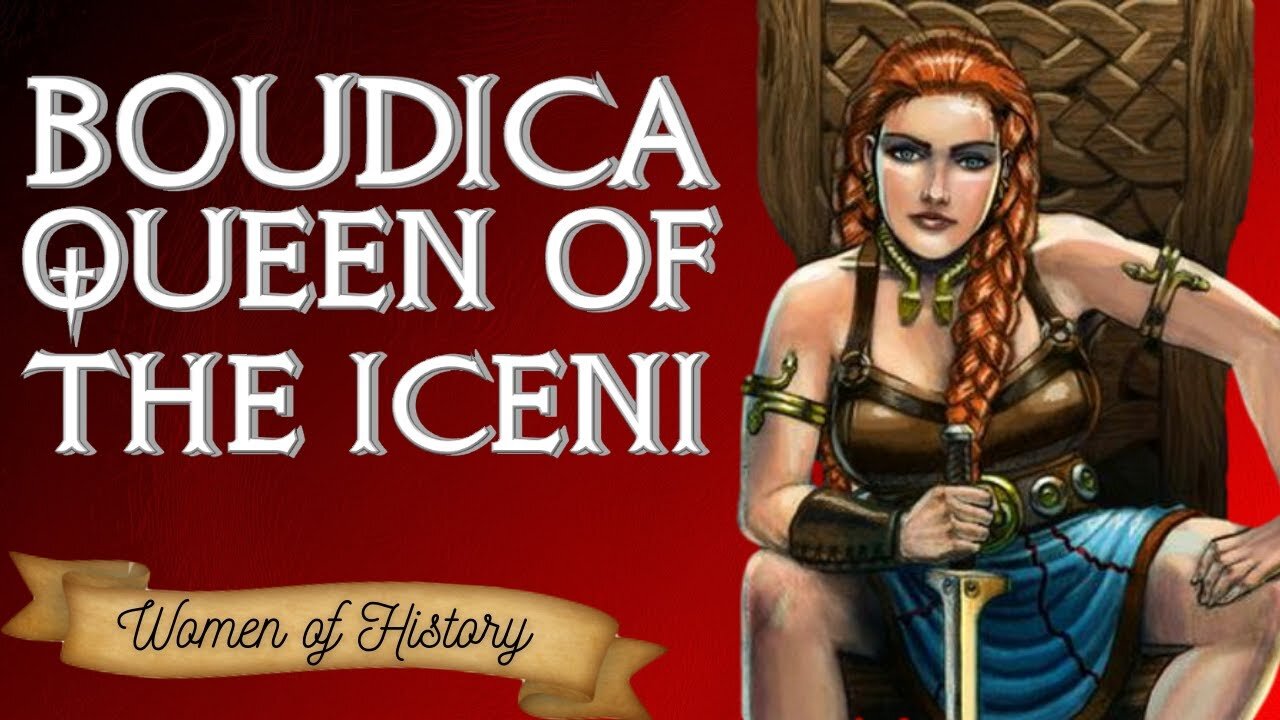Premium Only Content

Queen Boudica of the Iceni - Warrior Hero Who Defeated the Romans
Boudica or Boudicca (UK: /ˈbuːdɪkə, boʊˈdɪkə/, US: /buːˈdɪkə/), also known as Boadicea (/ˌboʊ(ə)dɪˈsiːə/, also US: /ˌboʊæd-/) or Boudicea, and in Welsh as Buddug (IPA: [ˈbɨðɨɡ]), was a queen of the British Celtic Iceni tribe who led an uprising against the conquering forces of the Roman Empire in AD 60 or 61. Roman sources claimed she died shortly after its failure and was said to have poisoned herself or died of her wounds although there is no actual evidence of her fate. She is considered a British folk hero.
Boudica's husband Prasutagus, with whom she had two children whose names are unknown, ruled as a nominally independent ally of Rome, and left his kingdom jointly to his daughters and to the Roman emperor in his will. However, when he died, his will was ignored, and the kingdom was annexed and his property taken. According to Tacitus, Boudica was flogged and her daughters raped. Cassius Dio explains Boudica's response by saying that previous imperial donations to influential Britons were confiscated and the Roman financier and philosopher Seneca called in the loans he had forced on the reluctant Celtic Britons.
In AD 60 or 61, when the Roman governor Gaius Suetonius Paulinus was campaigning on the island of Mona (modern Anglesey) on the northwest coast of Wales, Boudica led the Iceni, the Trinovantes, and others in revolt. They destroyed Camulodunum (modern Colchester), earlier the capital of the Trinovantes but at that time a colonia, a settlement for discharged Roman soldiers and site of a temple to the former Emperor Claudius. Upon hearing of the revolt, Suetonius hurried to Londinium (modern London), the 20-year-old commercial settlement that was the rebels' next target. He lacked sufficient numbers to defend the settlement, and he evacuated and abandoned Londinium. Boudica led a very large army of Iceni, Trinovantes, and others against a detachment of Legio IX Hispana, defeating them, and burning Londinium and Verulamium.
An estimated 70,000–80,000 Romans and British were then killed in the three cities by those following Boudica, many by torture. Suetonius, meanwhile, regrouped his forces, possibly in the West Midlands; despite being heavily outnumbered, he decisively defeated the Britons. The crisis caused Nero to consider withdrawing all Roman forces from Britain, but Suetonius's victory over Boudica confirmed Roman control of the province. Boudica then either killed herself to avoid capture (according to Tacitus), or died of illness (according to Cassius Dio).
Interest in these events was revived in the English Renaissance and led to Boudica's fame in the Victorian era. Boudica has remained an important cultural symbol in the United Kingdom.
#WomenofHistory #HistoricalWomen #FamousFemales
-
 10:23
10:23
Parry This
1 year agoMarie "Madame" Curie - First Woman to Ever Win A Nobel Prize
102 -
 2:14:18
2:14:18
The Pascal Show
11 hours ago $0.04 earnedTHEY LIED TO POLICE AGAIN? Jake & Rebecca Haro Have Lost Their Minds! Emmanuel Haro Search Continues
137 -
 1:25:52
1:25:52
TruthStream with Joe and Scott
2 days agoSG Sits Down w/ LT From "And We Know": An 80K FT View of Humanity's Great Awakening from 8/22/2025
10.1K16 -
 15:54
15:54
Lacey Mae ASMR
9 hours agoASMR For Sleep in 15 Minutes!
35 -
 LIVE
LIVE
Price of Reason
10 hours agoTrump FIRES Fed Governor Lisa Cook! Cracker Barrel CRISIS Continues! James Gunn DCU Woes! Gamescon!
9,618 watching -
 2:25:01
2:25:01
FreshandFit
5 hours agoTyreek Hill Pays Ex Wife $1 Million in Ongoing Fees From Divorce?!
26.1K3 -
 2:03:46
2:03:46
Inverted World Live
6 hours agoHaunted Dolls Hack Amazon Alexa | Ep. 98
98.9K2 -
 3:09:53
3:09:53
Laura Loomer
7 hours agoEP140: Loomer EXPOSES Islamification At US State Department
29.8K12 -
 3:05:00
3:05:00
TimcastIRL
7 hours agoTrump Floats Accepting 600,000 Chinese Student Visas, MAGA Uproar | Timcast IRL
203K135 -
 8:44:47
8:44:47
SpartakusLIVE
12 hours ago$20,000 Hide and Seek Tourney w/ Stonemountain64 || #1 Rat wins the BIG CHEESE
66.5K